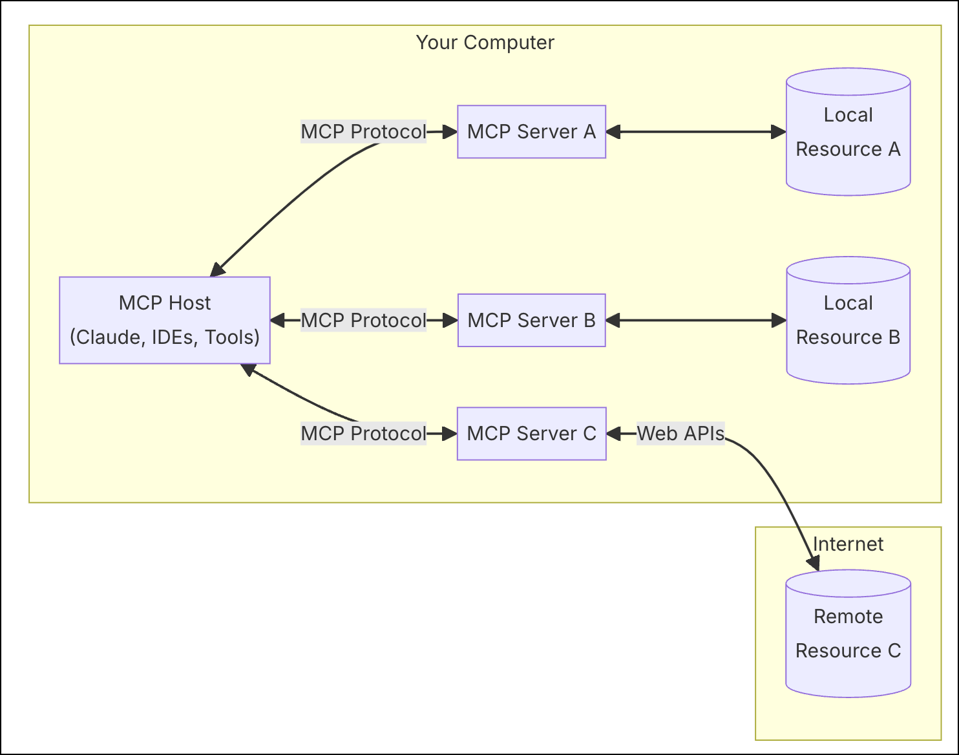- The Hitchhiker's Guide to Automated Systems
- Posts
- The Hitchhiker's Guide to Model Context Protocol
The Hitchhiker's Guide to Model Context Protocol
MCP: The USB-C of AI Integration That Will Save You a Fortune
The Hitchhiker’s Guide To Automated Systems
⇨ More about automated systems: lostrowski.pl
⇨ Templates | Blueprints | Products : lostrowski.pl/products
Ever tried connecting your AI to your business data only to end up with a tangled mess of custom APIs, band-aid solutions, and integration headaches? If you're nodding along, you're not alone. Most businesses attempting to make their AI tools "context-aware" are burning cash on custom integrations faster than Arthur Dent could say, "Don't Panic."
But here, enter the Model Context Protocol (MCP) – Anthropic's open standard about making AI integration as simple as plugging in a USB cable. It's the universal translator your business needs between large language models and your valuable data sources.

What's new on the MCP block:
🔌 Standardized Connections: One protocol to connect your AI to everything – databases, Google Drive, Slack, and APIs – cutting integration costs by 60-80%.
🔄 Real-time Context: Your AI now sees live data updates instead of stale snapshots, improving decision quality by 40%.
🔒 Centralized Security: Manage all AI data access through a single governance layer instead of configuring each integration separately.
Key Points & Architecture:
MCP works through a client-server model with three components:
Host: The interface to your LLM (like Claude Desktop)
Client: Manages connections to your servers
Servers: Domain-specific adapters for your databases, APIs, etc.
It uses JSON-RPC 2.0 for messaging and offers both local (STDIO) and cloud (HTTP+SSE) transport options, making it flexible for any deployment.
Performance & Cost:
Development: 70% less integration code to write and maintain
API Costs: $0.02-$0.15 per 1k transactions vs traditional $0.10-$0.40
Time-to-Value: Integration in less than 72 hours instead of 6-12 days per service
Compared to custom middleware solutions, MCP delivers an 80% lower total cost of ownership over 3 years while maintaining enterprise-grade reliability.
Market Impact:
Early adopters like Zed, Replit, and Sourcegraph have already integrated MCP for development environments. Companies report 9-month payback periods primarily through developer productivity gains.
The number of available servers is growing daily. To see the most updated list go to modelcontextprotocol/servers
Why This Matters:
Data Silos Are Crumbling: MCP gives your AI a unified view across previously isolated systems, enabling truly intelligent automation.
AI Accuracy Revolution: Context-aware AI makes 22-30% fewer errors when it has access to your real-time business data.
Future-Proofing: As the likely standard for 87% of enterprise LLM deployments by 2026, early adoption gives you a competitive edge.
Practical Applications:
For Development Teams:
Connect your existing codebase to AI assistants through MCP-enabled IDEs (Zed, Replit), reducing coding time by 40% through contextual suggestions.
For Data Teams:
Build MCP servers for your data warehouses, enabling AI to directly query relevant information instead of requiring manual data exports.
For Operations:
Integrate MCP with workflow tools to create self-healing systems that can identify and resolve issues by accessing multiple data sources in real-time.
Executive Summary:
MCP is to AI what USB was to peripherals – a universal connection standard that just works.
Simplifies Integration: One protocol connects your AI to everything.
Reduces Costs: 60-80% lower integration and maintenance expenses.
Accelerates Development: 72-hour implementation instead of months.
The bottom line: If you plan to scale AI across your business, MCP will save you a fortune in integration costs while delivering more accurate, context-aware solutions.
Need Help Implementing MCP?
I specialize in building automated systems that leverage protocols like MCP to connect your business data with AI tools. My implementation services can help you:
Audit your existing API integration costs
Build your first MCP servers for critical data sources
Design an MCP implementation roadmap customized for your tech stack
Book a free 30-minute consultation to discuss how we can make MCP work for your business needs.
What's Next?
I'll continue on AI Agents and MCP in next week's newsletter.
Until then, remember: Don't panic, and always build systems that do the work for you!
Lucas Ostrowski
P.S. If you found this helpful, forward it to a colleague struggling with AI integration. They'll thank you for saving them from the infinite improbability of custom API hell.

